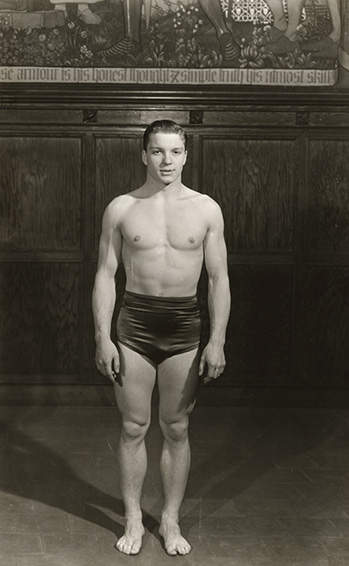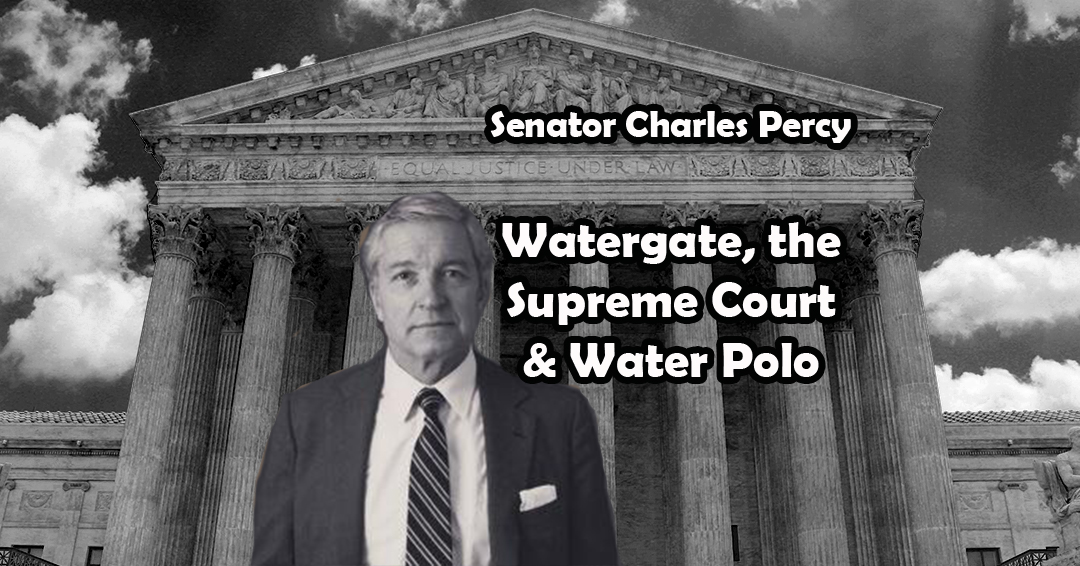BRIDGEPORT, Pa. — Water Polo player, corporate leader, United States Senator, potential vice-presidential candidate, Watergate investigation instigator and Supreme Court justice maker, Charles Percy led a life which touched every aspect of American culture.
A businessman who represented Illinois for nearly 20 years in the U.S. Senate, once headed the chamber’s powerful Foreign Relations Committee and harbored unrealized ambitions to run for the presidency, Charles Harting “Chuck” Percy (September 27, 1919 – September 17, 2011) was born in Pensacola, Fla., to Edward H. Percy and the former Elizabeth Harting. His father, an Alabama native descended from colonial-era Mississippians and Virginians, was at various times an automobile salesman and bank cashier, while his Illinois-born mother was a concert violinist.
During his infancy, the family relocated to Chicago where his father acquired a job as a cashier in the Rogers Park National Bank. However, the bank failed in the Great Depression and Percy’s father spent the family’s savings and was forced into bankruptcy and on welfare.
Percy attended Sullivan High School in Rogers Park for the first two years and New Trier High School for the last two years. The family had moved to Wilmette in 1935 after the father found temporary employment. At the age of 16, Joseph McNabb, Percy’s Sunday School teacher – who was also President and a large stockholder in Bell & Howell – offered his father a job in the mailroom of the company.
The hiring would prove fortuitous for Percy as it launched a career at Bell & Howell and ultimately the Senate.
Percy, who started at Bell & Howell as an apprentice in 1938, worked five jobs to pay his tuition while attending the University of Chicago. During his time at Chicago, he was elected president of the Alpha Delta Phi fraternity and of the University Inter-Fraternity Council, and captain of the water polo team and became friendly with a classmate named John Paul Stevens. Serving as “Marshal” to then University of Chicago President Hutchins, a position which served as the student’s voice to the administration of the school, Percy noted that the Hutchins was adamantly opposed to athletics going to the lengths of banning baseball from campus.
“He didn’t see why I should spend time on sports,” noted Percy in a 1998 interview . “However, during his tenure as president of the University of Chicago, this was the last time that the university won a “Big 10” championship. When I was captain of the water polo team, the water polo team did win the last “Big Ten” championship (the last Big Ten Championship in school history as Chicago withdrew from the league in 1946 as Hutchins de-emphasized varsity athletics in 1939 and dropped football. The school now competes on the National Collegiate Athletic Association (NCAA) Division III level and no longer sponsors water polo).
 “I went out for water polo because I liked to wrestle and I liked to swim and in my freshman year was doing both. The two coaches, for water polo and wrestling, told me: “You ought to make up your mind as to which one you want. One sport strengthens your muscles and the other one loosens them. So the two sports may be working against each other.” I was combining the two sports when I switched to water polo, where you kind of wrestle in the water against your opponents.”
“I went out for water polo because I liked to wrestle and I liked to swim and in my freshman year was doing both. The two coaches, for water polo and wrestling, told me: “You ought to make up your mind as to which one you want. One sport strengthens your muscles and the other one loosens them. So the two sports may be working against each other.” I was combining the two sports when I switched to water polo, where you kind of wrestle in the water against your opponents.”
Percy, who completed his Economics degree in 1941, assumed a full-time position at Bell & Howell following graduation. Astute at business, within a year he was appointed a director of the company.
Due to working in the projector side of the company during his college days, Percy had the foresight in the final days of his college career to note that the light metals the projectors were made out of would be requisition the resource for planes.
“I asked whether then Bell & Howell would have to make cameras and projectors out of lead? How could the kids in the schools carry lead projectors around their school classes? So I thought that Bell & Howell would then need to get into war work. That’s the department that I would want to work in.”
The company created a “War Coordinating Department” and placed Percy in charge – at the age of 21 – to lead the company’s war production efforts starting in May 1941.
“I was very much interested in the U.S. Navy, and soon obtained a contract for Bell & Howell to manufacture “gunsight aiming point cameras” to put in Navy aircraft. I also was able to get Bell & Howell a contract from the Navy for “torpedo directors.” That was totally different from anything that the company had previously manufactured, but they had the necessary skills. I knew that they had the engineering and manufacturing skills to do it. So we were “under way” with both of those contracts. Then on December 7, 1941 Pearl Harbor was bombed by Japanese naval aircraft and the United States became deeply involved in World War II. So the Navy sought me out to procure the lenses for these two and other devices. At the time, Bausch and Lomb was the only lens company of any size in the United States. We had previously bought a lot of lenses from Germany and Japan. Now those sources of supply were cut off. So I applied to the U.S. Government Defense Plant Corporation for money to build a plant to manufacture lenses on Bell & Howell property. This was a project involving millions of dollars, and we were successful in getting the money to build that plant.”
Although exempted from military service as an “essential worker” Percy went to company President McNabb, appointed his successor, resigned from Bell & Howell and enlisted into military service.
However, prior to his departure McNabb asked him to write a letter within three months explaining what Bell & Howell should do after the war. By doing this, the company kept him on a partial salary and got him into the Navy with the “G-7″ program.”
Percy was appointed an Apprentice Seaman, did a 60-day training stretch at Dartmouth College, was commissioned an Ensign and was deployed to Washington D.C. as a Naval gunnery officer.
In 1943, he was reassigned to form the “Advanced Base Aviation Training Unit” and was ordered to set up a program wherever he deemed appropriate to train pilots, teach out to extinguish aircraft fires and instruct officers on the use of the gunnery cameras developed by Bell & Howell.
He selected the Naval Base at Alameda, near San Francisco, to establish the program. While at Alameda, and with the war winding down, his job expanded as the Navy had questions about a group formed at the “Cow Palace” in San Francisco working on a new organization for the post-war wars – the United Nations. It would launch an interest in the U.N. for Percy who would later serve as a delegate during his tenure in the Senate.
Percy returned to Bell & Howell in 1945 and quickly got back to work in the civilian market. In 1949, Percy was named one of the “Outstanding Young Men in America”, along with Gerald R. Ford Jr., of Michigan, future U.S. President, and John Ben Shepperd, future Texas Attorney General. It was also during this year that McNabb died and Percy was elevated to President of Bell & Howell
During his leadership, Percy expanded Bell & Howell, raising revenues 32-fold and the number of employees 12-fold, and listing the company on the New York Stock Exchange. While continuing to manufacture movie cameras and movie and sound projectors for military, commercial, and home use, he also pushed the company into the production of microfilm and the markets of information services.
In the late 1950s, Percy decided to enter politics. With the encouragement of then U.S. President Dwight D. Eisenhower, Percy helped to write Decisions for a Better America, which proposed a set of long-range goals for the Republican Party. He belonged to the moderate and liberal wing of the Republican party, led by Eisenhower during his presidency and later closely identified with New York Governor Nelson A. Rockefeller. Percy hoped to broaden the base of the party.
Only 40 at the time, he was offered and turned down the vice-president spot on the 1960 Republican ticket with Richard Nixon. John F. Kennedy, who went on to defeat Nixon in the 1960 election, listed Percy as one of the most promising newcomers on the political scene and among his biggest rivals for the political leadership of their generation.
The offer may have sparked political goals for Percy who resigned from Bell & Howell and made his first foray into politics with a run for governor of Illinois in 1964, which he narrowly lost to Democratic incumbent Otto Kerner.
In 1966, Percy ran for senator from Illinois. His 21-year-old daughter Valerie was murdered at the family home in September, late in the campaign. Her death was thought to have been caused by an intruder, but the crime was never solved despite a lengthy investigation.
He upset Democratic Senator Paul Douglas (a former professor of Percy’s at the University of Chicago) with 56 percent of the vote. One year into his service in the Senate, Percy appeared on the television show Face The Nation with the other newly elected Republican Senators. It was noted that then President Lyndon Johnson noted privately that he thought Percy would make a fine President if the opportunity should ever arise.
Percy was drawn into the Vietnam conflict in December 1967 as he met with South Vietnamese President Thieu and assured him that “no responsible people in either the Democratic or the Republican Party favored US withdrawal from South Vietnam”.
Also in 1967, Percy introduced a bill to establish a program to stimulate production of low-cost housing. Percy’s proposal was the first of its kind to provide home ownership to low-income families, and it received strong support from Republicans in both the House and the Senate, although it ultimately did not pass. When asked why he selected housing for his first major legislative proposal, Percy said: “Of all the problems I ran across during three years of campaigning, first for the governorship and then for the Senate, the most appalling in their consequences for the future seemed to be the problems of the declining areas of the city and countryside, the inadequacy of housing.” Percy voted in favor of the Civil Rights Act of 1968 and the confirmation of Thurgood Marshall to the U.S. Supreme Court.
When in the Senate less than two years, Percy was mentioned as a Republican hopeful for the 1968 Presidential nomination. The New York Times columnist James B. Reston referred to him as “the hottest political article in the Republican Party”. The positioning of Percy as a leading candidate for the Republican nomination did him no favors with the man who viewed him as his biggest challenger and went on to claim the presidency – Richard Nixon.
“Percy and Nixon are two to one” odds for the nomination, Nixon observed privately in the winter of 1967. “(Ronald) Reagan is four to one. Rocky (Nelson Rockefeller) has no chance at all.”
The Illinois senator, however, took himself out of contention for the nomination, saying that he lacked experience for the presidency. Though Percy was eager to be considered for the vice presidency, he killed his chances by supporting Rockefeller over Nixon for the presidential nomination.
In 1972, Percy sought a second term to the Senate. In the general election, he defeated Congressman Roman Pucinski by a landslide of over one million votes – the biggest margin of victory in any senatorial election that year.
An ardent opponent of the Vietnam War following his earlier conversation with Theiu, a supporter of international nuclear non-proliferation, a backer of federal consumer protection efforts and tougher enforcement of laws against drug abuse, he earned a unique footnote in history by being the first senator to call for a special prosecutor to investigate Watergate, the political scandal that brought down Nixon’s presidency. Due to calling for an investigation into Watergate – and his earlier place as a challenger for the Republican nomination – Percy earned himself a prominent place on Nixon’s infamous “List of Enemies”.
Almost overnight, Percy started campaigning for the 1976 presidential nomination, eventually forming an exploratory committee. But his White House dreams were shattered in 1974 by Nixon’s resignation and the decision of the new president, Gerald Ford, to seek a full term. Percy threw his full support to Ford as both the new President and for an attempt at reelection in 1976.
While serving in the Senate, Percy introduced legislation in 1974 making the 55 miles-per-hour National Maximum Speed Limit permanent, which became law in January 1975, remaining in effect until it was amended in 1987 to allow 65 mph on rural Interstate highways and finally repealed in 1995.
In 1977, Percy and Sen. Hubert H. Humphrey—responding to the 1973 OPEC oil embargo and high energy prices in general—created the Alliance to Save Energy which encouraged a national commitment to energy efficiency. Percy was the founding chairman of the organization and helped bring to the forefront of American culture energy efficiency.
In 1978, Percy won election to the Senate by a narrow 53-to-46 margin.
After the Republicans won control of the Senate in 1980, Percy became chairman of the Foreign Relations Committee. He served in the Senate until the end of his third term in January 1985, after narrowly losing to Congressman Paul Simon in 1984.
While in the Senate, Percy was active in business and international affairs. Although he explored the possibility of running for President in both 1968 and 1976, he did not run either time. Percy was mentioned again for the presidency in 1980 and 1988, but his candidacies did not progress beyond the exploratory stage.
However, arguably his most important action was ending the practice in Illinois of nominating federal judges from a pool of candidates generated by the Chicago political machine. He implemented a system of consultation with, and advice from, groups of legal experts, including the professional bar association. It was Percy who recommended former University of Chicago classmate John Paul Stevens to the Nixon White House for the U.S. Court of Appeals bench in Chicago in 1970. Further, it was Percy who pushed for and introduced Stevens when President Ford nominated him as a justice of the United States Supreme Court.
Stevens, who served from 1975 until his retirement in 2010, was the second-oldest-serving justice in the history of the court and the third-longest-serving justice at the time of his departure from the bench. His long tenure saw him write for the court on most issues of American law, including civil liberties, death penalty, government action and intellectual property. In cases involving presidents of the United States, he wrote for the court that they were to be held accountable under American law.
Although out of office, Percy maintained a connection to politics until his death from Alzheimer’s disease in 2011. His daughter, Shannon, the twin sister of his murdered daughter, married John D. Rockefeller IV. Rockefeller became a politician and was later as elected Democratic Governor of West Virginia (1977–1985) before serving as a United States Senator for West Virginia from 1985 until 2015.




